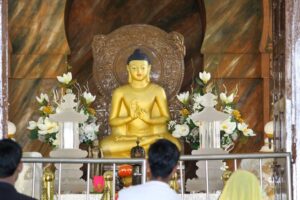
Death is a universal experience, and it is natural for people to ponder the afterlife. However, not all religions believe in an afterlife: Buddhism, Jainism, Taoism and other lesser-known faiths such as Shinto and Zoroastrianism reject this concept. These religions have their own unique ways of approaching death, life after death and reincarnation. In this article we will explore why these faith traditions do not accept a belief in an afterlife and investigate what implications this has for their views on life and death. By understanding these ancient beliefs better we can gain insight into how different cultures perceive one of mankind’s most mysterious questions – what happens after we die?
Exploring the Religions That Do Not Believe in an Afterlife
Buddhism is one of the most widely practiced religions in the world, but it does not believe in an afterlife. Instead, Buddhists focus on this life and emphasize awakening to a higher level of spiritual understanding. They view death as an opportunity to move beyond physicality and attain Nirvana, which is a state of perfect peace and liberation from suffering. Jainism also rejects the notion of an afterlife, instead encouraging its followers to embrace the present moment and strive for personal enlightenment through meditation and self-awareness.
Moreover, Taoism does not place emphasis on life after death either. It encourages its adherents to live harmoniously with nature and strive for balance between opposing forces like yin and yang. Taoists reject notions of an afterlife and believe that death is simply the end of a physical life, with no consequences in the spiritual realm.
Unraveling the Mystery of Death Through Buddhist, Jainist and other Ancient Faiths
While Buddhism, Jainism and Taoism are the most widely practiced religions that do not accept an afterlife, there are also other lesser-known faiths such as Shinto and Zoroastrianism that hold similar beliefs. Shinto religion is based on ancestor worship; it does not emphasize an afterlife, but instead encourages its practitioners to venerate their ancestors through rituals like offering food offerings to them at shrines. Zoroastrianism has many similarities with Hinduism, but also rejects belief in an afterlife; they believe that after death people will be judged by a divine being who will decide whether they are worthy of going to Heaven or Hell.
So why do these religions reject a belief in an afterlife? The answer may lie in their views on life and death. These faiths all emphasize the importance of living a meaningful life and achieving personal enlightenment while alive. They also believe that death is simply the end of physical existence, and not something that determines spiritual destiny. Thus, they reject notions of an afterlife because it would be seen as an escape from responsibility for one’s actions during life.
The Search for Answers to Life’s Biggest Questions: No Afterlife?
By understanding these ancient beliefs about life after death better we can gain insight into how different cultures perceive this mystery. It is clear that not all religious traditions accept a belief in an afterlife, but rather seek to live meaningfully and find wisdom in the present moment. This can be a powerful reminder that life is precious and should not be taken for granted.
In conclusion, while there are many religions that do not believe in an afterlife, they still approach death in unique ways. Buddhism, Jainism, Taoism and other lesser-known faiths reject notions of an afterlife because it would be seen as an escape from responsibility for one’s actions during life. By understanding these ancient beliefs better we can gain insight into how different cultures perceive this mystery. Ultimately, these faith traditions emphasize the importance of living a meaningful life and achieving personal enlightenment while alive – reminding us that life is precious and should not be taken for granted.
What Happens When We Die? Examining World Religions that Reject an Afterlife
The search for answers to life’s biggest questions can be a difficult one, and the idea of an afterlife is no exception. While many religions accept a belief in an afterlife, there are some who reject this notion such as Buddhism, Jainism and Taoism, as well as lesser-known faiths like Shinto and Zoroastrianism. These religions emphasize living a meaningful life and achieving personal enlightenment while alive. They also believe that death is simply the end of physical existence, and not something that determines spiritual destiny. Ultimately, understanding these beliefs helps us appreciate the importance of living with purpose during our short lives on earth – reminding us that life is precious and should not be taken for granted.
Conclusion
By exploring the various world religions that do not believe in an afterlife, we can gain a deeper understanding of how different cultures perceive this mystery. These faiths all emphasize living a meaningful life and finding wisdom in the present moment – reminding us that life is precious and should not be taken for granted. Ultimately, these beliefs can help us appreciate our lives more fully and find purpose during our short time on earth.
This article has been written to provide a brief overview of what some of the major world religions have to say about life after death – or lack thereof. Through looking at Buddhism, Jainism, Taoism and other lesser-known faiths such as Shinto and Zoroastrianism, we have seen that they reject notions of an afterlife because it would be seen as an escape from responsibility for one’s actions during life. By understanding these ancient beliefs better, we can gain insight into how different cultures perceive this mystery and appreciate the importance of living a meaningful life on earth.